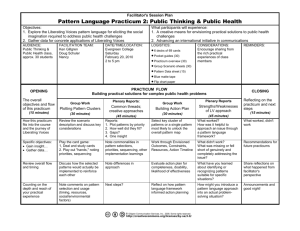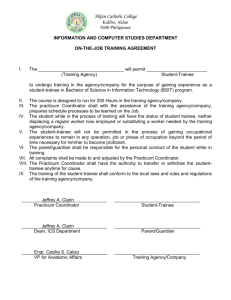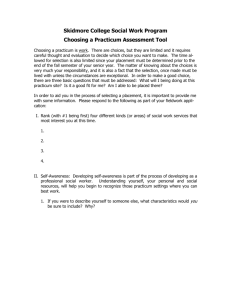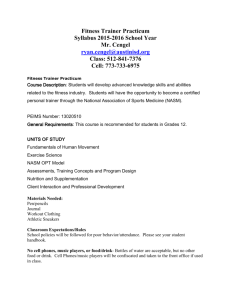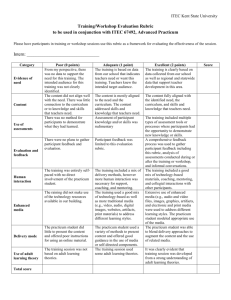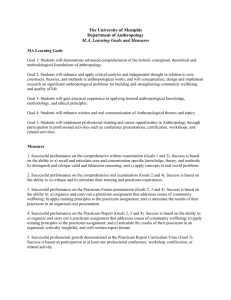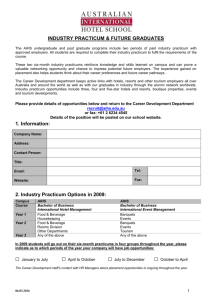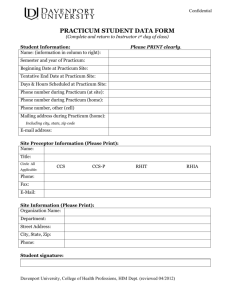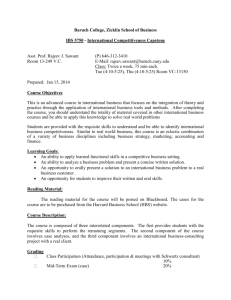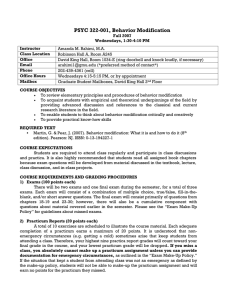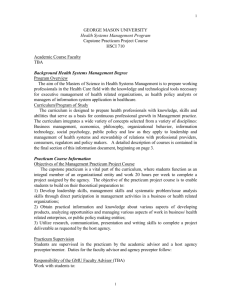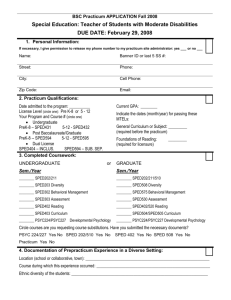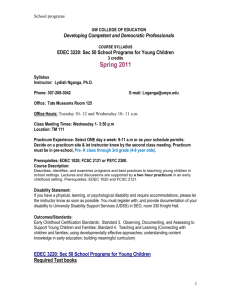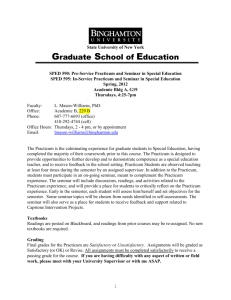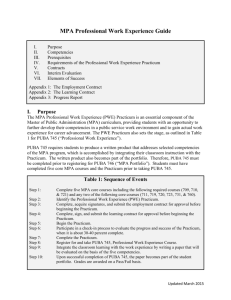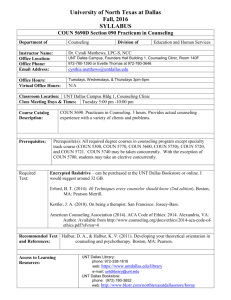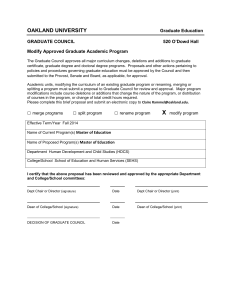- Cape Area Management Program
advertisement
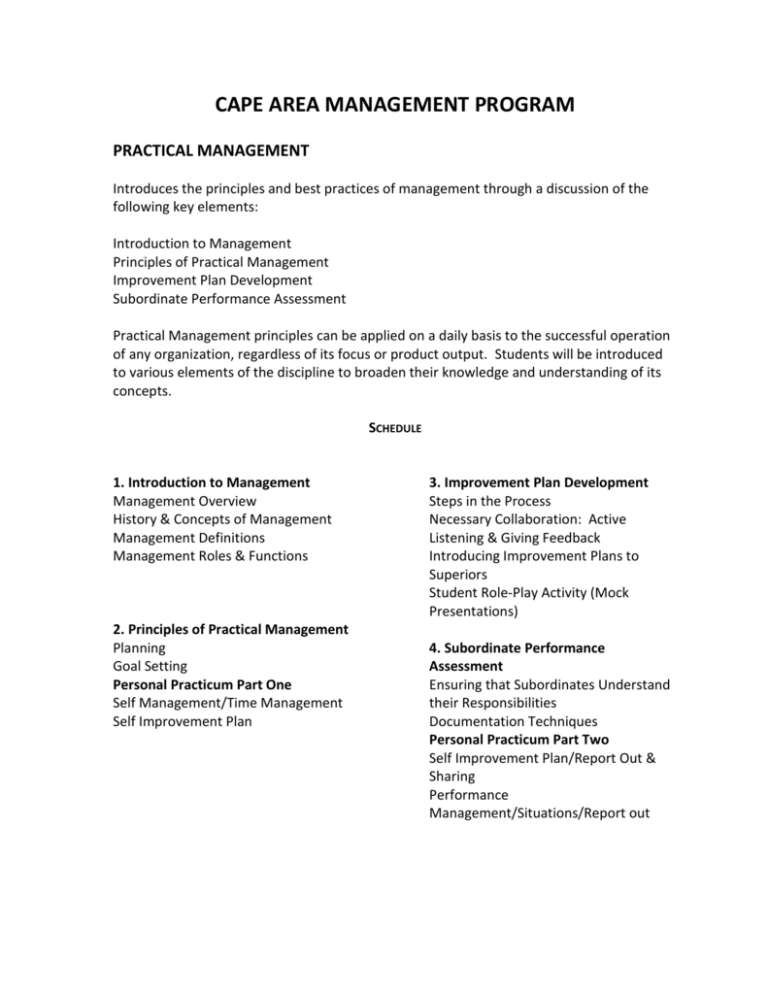
CAPE AREA MANAGEMENT PROGRAM PRACTICAL MANAGEMENT Introduces the principles and best practices of management through a discussion of the following key elements: Introduction to Management Principles of Practical Management Improvement Plan Development Subordinate Performance Assessment Practical Management principles can be applied on a daily basis to the successful operation of any organization, regardless of its focus or product output. Students will be introduced to various elements of the discipline to broaden their knowledge and understanding of its concepts. SCHEDULE 1. Introduction to Management Management Overview History & Concepts of Management Management Definitions Management Roles & Functions 2. Principles of Practical Management Planning Goal Setting Personal Practicum Part One Self Management/Time Management Self Improvement Plan 3. Improvement Plan Development Steps in the Process Necessary Collaboration: Active Listening & Giving Feedback Introducing Improvement Plans to Superiors Student Role-Play Activity (Mock Presentations) 4. Subordinate Performance Assessment Ensuring that Subordinates Understand their Responsibilities Documentation Techniques Personal Practicum Part Two Self Improvement Plan/Report Out & Sharing Performance Management/Situations/Report out WORK TEAM DYNAMICS Introduces the principles and processes necessary to develop effective Teams through a discussion of the following key elements: Team Characteristics Goal Setting Motivating Subordinates Success Measurement Students will learn concepts ranging from the selection of individuals to the assignment of those most likely to work harmoniously and produce the desired results. SCHEDULE 1. Personal Practicum Part One Subarctic Survival Simulation Team Characteristics Types of Teams Team Formation Team Behavior Team Status & Authority 2. Team Goal Setting Need Assessment Task Selection Timeline Analysis Goal Documentation 3. Motivating Subordinates Theories of Motivation Effective Practices Achieving Team Buy-In Role Play Activity 4. Success Measurement Management by Objectives Types of Objectives Personal Practicum Part Two Self Improvement Plan Report Out Tools for use with your Teams GRPI Developing Operating Guidelines Team Decision Making Brainstorming PROJECT MANAGEMENT Introduces the principles and best practices of project management through a discussion of the following: Project Conceptualization & Understanding Linking Projects to Management & Organizational Goals Time & Project Focus Management Outcome Documentation The development of project management skills is crucial in the modern workplace, students will receive extensive instruction in the discipline. Project management skills can be used by employees to better manage their time, their work and their people. SCHEDULE 1. Project Conceptualization & Understanding Various Project Types The Successful Project Manager Project Planning Techniques Developing Project Plans 2. Linking Projects to Management & Organizational Goals Understanding Management & Organizational Goals “Go to the End” Planning to Meet Organizational Goals Role Determinations & Assignment Reaching Consensus Personal Practicum Part One Project Management- Key Steps Project Management Exercise 3. Time & Project Focus Management Establishing Project Milestones Organizing and Initiating the Effort Remaining On-Task (Project Monitoring & Control) Conflict Management 4. Outcome Documentation & Reporting Your Organization’s Report Format Accurate Records Keeping Mock Project Report Presentations Personal Practicum Part Two Self Improvement Plan Report Out Project Management Activities/Q&A CONTINUOUS QUALITY IMPROVEMENT (CQI) Introduces the principles and best practices of Continuous Quality Improvement through the following: Understanding “Quality” Defining “Quality” for Each Organization Identifying Crucial Processes Adding Measurable “Value” to Every-day Work by Improving Processes Continuous quality improvement has proven to be a valuable asset to organizations therefore First-Line Supervisors benefit when they understand the principles and apply them in the modern workplace. SCHEDULE 1. Understanding “Quality” Historical Perspective of Quality What “Quality” Means The Application of Quality in the Modern Work Place Managing Quality Improvement 2. Defining Quality for Your Organization Your Organization’s Mission (Its’ Statement) Benefits of Quality Improvement Processes to Your Organization Applying Quality Improvement Processes to Your Organization Personal Practicum Part One Leadership & Empowerment Quality Function Deployment Activity 3. Identifying Crucial Processes Working with Organizational Leaders to Determine Need Process Identification Documenting Your Findings Understanding Process Improvement Process Improvement Steps 4. Process Improvement Announcing the Change Recognizing & Rewarding the Contributors Pledge to Continuously Improve Personal Practicum Part Two Final Self Improvement Plan Report Out Q&A



